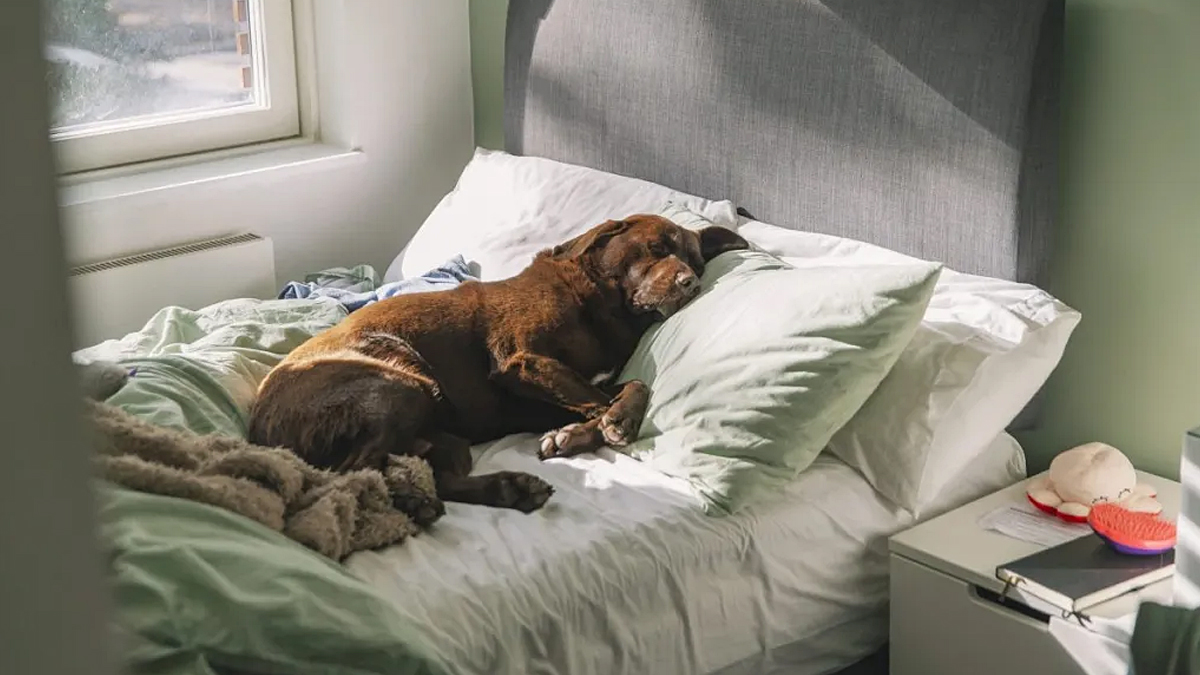Dogs Should Not Sleep In The Bed TikTok: The Debate That's Got The Internet Talking
There’s a viral trend on TikTok right now that’s sparking heated debates: dogs should not sleep in the bed. It’s a topic that’s dividing pet parents everywhere. Some people swear it’s bad for their dogs, while others think it’s perfectly fine. But before we dive into the nitty-gritty, let’s talk about why this has become such a big deal. It’s not just about where your furry friend sleeps; it’s about boundaries, health, and even psychology. So, buckle up because we’re about to break it all down.
This whole dogs-should-not-sleep-in-the-bed TikTok craze started with users sharing their personal experiences and opinions. Some claim it ruins sleep quality, others argue it strengthens the bond between humans and pets. It’s like the modern-day version of the great coffee vs. tea debate—everyone has an opinion, and no one agrees.
Now, before we get too far ahead of ourselves, let’s address the elephant in the room (or should I say, the dog in the bed?). Is it really that bad? Or is it just another Internet drama that’ll blow over in a few weeks? Stick around because we’re going to explore the science, the psychology, and the practical tips behind this viral trend.
Read also:Mother's Cocaine Fueled School Run Chaos
What's the Big Deal About Dogs Sleeping in the Bed?
Let’s start by understanding why dogs sleeping in the bed is such a hot-button issue. It’s not just about the physical act of sharing your mattress with Fido; it’s about what it represents. For some, it’s a sign of affection and closeness. For others, it’s a slippery slope toward bad habits and behavioral issues.
Think about it: if your dog sleeps in your bed, are they more likely to think they’re the alpha of the household? Could it lead to territorial behavior or even anxiety? These are questions that many TikTok creators are asking, and they’re sparking some pretty intense discussions.
Why TikTok Loves This Debate
TikTok thrives on controversy, and this topic fits right into that mold. Videos showing dogs snuggling up with their owners often rack up millions of views, but so do videos warning against it. It’s a perfect storm of emotion, opinion, and viral potential.
And let’s not forget the humor factor. Some TikTokers are using this debate to create hilarious skits, poking fun at the idea of dogs hogging the blankets or stealing all the pillows. It’s entertaining, relatable, and, well, kind of addictive.
Health Implications: Should You Worry?
Now let’s talk about the elephant in the room—or rather, the dog in the bed. Is sharing your bed with your dog actually harmful? There are a few things to consider here:
- Hygiene Concerns: Dogs can carry fleas, ticks, and other parasites. If they sleep in your bed, there’s a chance these critters could end up on your sheets or even your skin.
- Allergies: Even if you don’t think you’re allergic to dogs, sharing a bed with them could trigger symptoms like sneezing, itching, or congestion.
- Sleep Quality: Studies show that sharing a bed with a pet can disrupt your sleep. Dogs move around, bark, or even snore, which can make it harder for you to get a good night’s rest.
Of course, not everyone will experience these issues. For some, sleeping with their dog is a comforting experience that actually improves their sleep. But it’s important to weigh the pros and cons before making a decision.
Read also:2 Without Hats A Deep Dive Into Their World And Style
Scientific Studies: What the Experts Say
There’s been some research done on this topic, and the results are mixed. One study found that people who slept with their dogs reported lower sleep quality compared to those who kept their pets in another room. However, another study suggested that having a dog in the bedroom (but not on the bed) could actually improve sleep by providing a sense of security.
So, what’s the verdict? It depends on your individual circumstances. If you have allergies or sleep issues, it might be best to keep your dog out of the bedroom altogether. But if you’re a light sleeper and your dog doesn’t disturb you, there’s no harm in letting them stay.
Psychological Effects: Is It Good for Your Dog?
Now let’s flip the script and talk about how sleeping in the bed affects your dog. Some experts believe that allowing dogs to sleep in your bed can lead to behavioral issues, such as:
- Separation Anxiety: Dogs who are used to sleeping with their owners may struggle when left alone.
- Boundary Issues: If a dog thinks they’re on the same level as their human, they may start to challenge authority.
- Comfort Dependency: Some dogs may become overly reliant on their owners for comfort, which can hinder their independence.
On the flip side, many dog owners argue that sleeping in the bed strengthens the bond between them and their pet. It’s a way of showing affection and trust, which can be beneficial for both parties.
Training Tips: How to Set Boundaries
If you’re worried about the potential downsides of letting your dog sleep in your bed, there are ways to set boundaries without completely banning them from the bedroom. Here are a few tips:
- Create a Separate Bed: Invest in a comfortable dog bed and place it in your bedroom. This gives your dog their own space while still allowing them to be close to you.
- Set Clear Rules: Decide whether your dog is allowed on the bed at certain times or under certain conditions. Consistency is key when it comes to training.
- Use Positive Reinforcement: Reward your dog for following the rules. This will help them understand what’s expected of them and make the transition smoother.
Practical Solutions: Finding a Happy Medium
Not everyone is ready to give up the cuddle time with their furry friend, and that’s okay. The key is finding a solution that works for both you and your dog. Here are a few practical ideas:
- Designated Days: Allow your dog to sleep in the bed on certain nights, but not others. This gives them the opportunity to bond with you without making it a daily habit.
- Guest Room Setup: If you have an extra room, consider turning it into a dog-friendly space with a comfortable bed, toys, and other essentials.
- Bedtime Routine: Establish a routine that includes calming activities, like brushing or cuddling, before bedtime. This can help your dog wind down and prepare for sleep.
Ultimately, the goal is to create a sleeping arrangement that benefits both you and your dog. Whether that means sharing a bed, having separate spaces, or something in between, the choice is yours.
Real-Life Examples: What Other Dog Owners Are Doing
To get a better understanding of how different people approach this issue, we reached out to a few dog owners and asked them about their experiences. Here’s what they had to say:
Jessica: “I used to let my dog sleep in the bed, but it was affecting my sleep. Now, I have a dog bed in the corner of my room, and she seems perfectly happy with it.”
Michael: “My dog has always slept in the bed, and I don’t see any issues. If anything, it makes our bond stronger.”
Sarah: “I tried keeping my dog out of the bedroom, but she would bark and scratch at the door all night. Eventually, I gave in and let her sleep on a blanket at the foot of the bed.”
Cultural Differences: How Other Countries View This Trend
Believe it or not, the idea of dogs sleeping in the bed isn’t universally accepted. In some cultures, it’s considered inappropriate or even taboo. For example, in many Asian countries, pets are typically kept outside the bedroom due to hygiene concerns.
In contrast, Western cultures tend to be more accepting of the practice. In fact, a survey conducted in the United States found that nearly 50% of dog owners allow their pets to sleep in their beds.
Why Cultural Norms Matter
Cultural norms can play a big role in how we view certain behaviors. What seems perfectly normal in one country might be seen as strange or even offensive in another. This is something to keep in mind when engaging in discussions about topics like dogs sleeping in the bed.
It’s also worth noting that cultural attitudes toward pets are changing. As more people adopt dogs as family members rather than just animals, the lines between human and pet relationships are becoming blurred.
Conclusion: The Final Word on Dogs Sleeping in the Bed
So, should dogs sleep in the bed? The answer, like most things in life, is it depends. If you’re dealing with allergies, sleep issues, or behavioral problems, it might be best to set some boundaries. But if you and your dog are both happy and healthy, there’s no harm in sharing a bed every now and then.
We hope this article has given you a better understanding of the dogs-should-not-sleep-in-the-bed TikTok trend and the various factors to consider. Remember, the most important thing is finding a solution that works for you and your furry friend.
Before you go, we’d love to hear your thoughts! Do you let your dog sleep in the bed? Why or why not? Leave a comment below and share this article with your fellow dog lovers. Together, we can keep the conversation going!
Table of Contents
What's the Big Deal About Dogs Sleeping in the Bed?
Health Implications: Should You Worry?
Psychological Effects: Is It Good for Your Dog?
Practical Solutions: Finding a Happy Medium
Cultural Differences: How Other Countries View This Trend
Conclusion: The Final Word on Dogs Sleeping in the Bed
Scientific Studies: What the Experts Say
Training Tips: How to Set Boundaries
Real-Life Examples: What Other Dog Owners Are Doing


